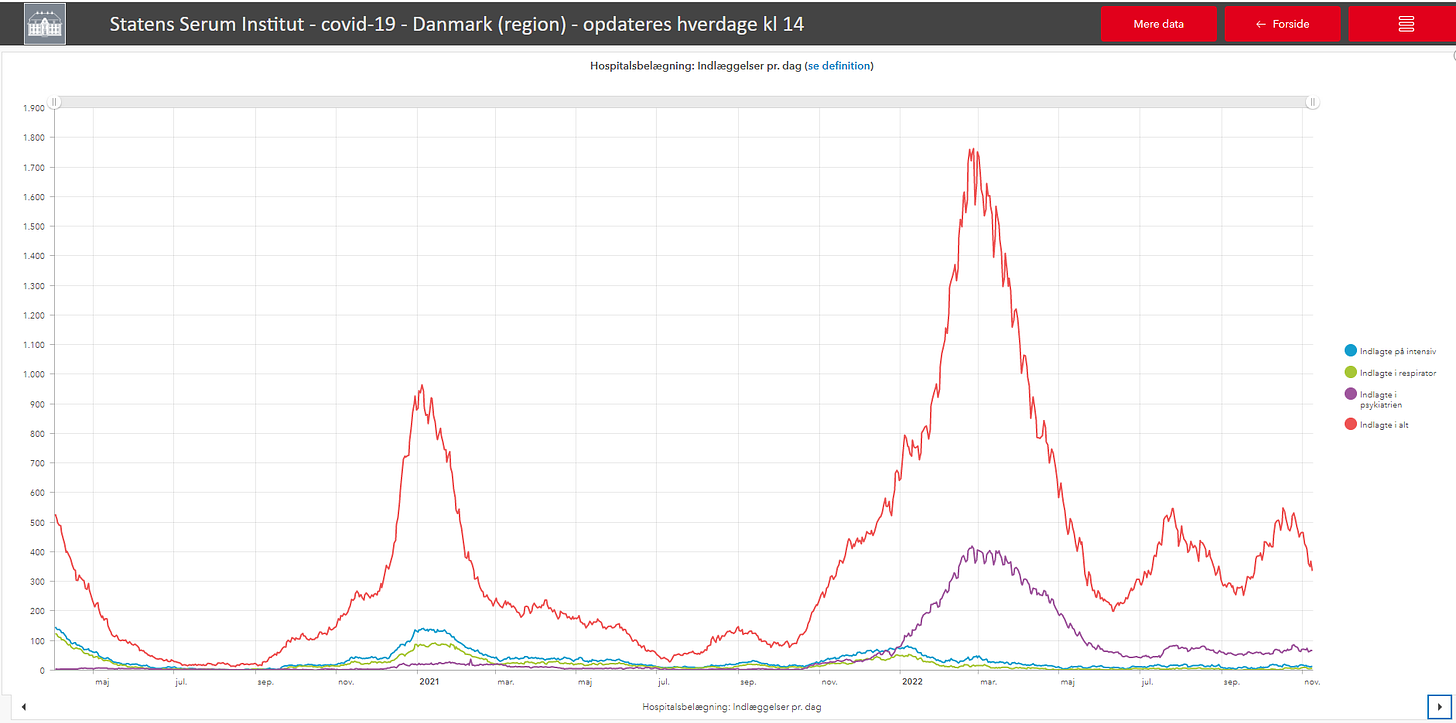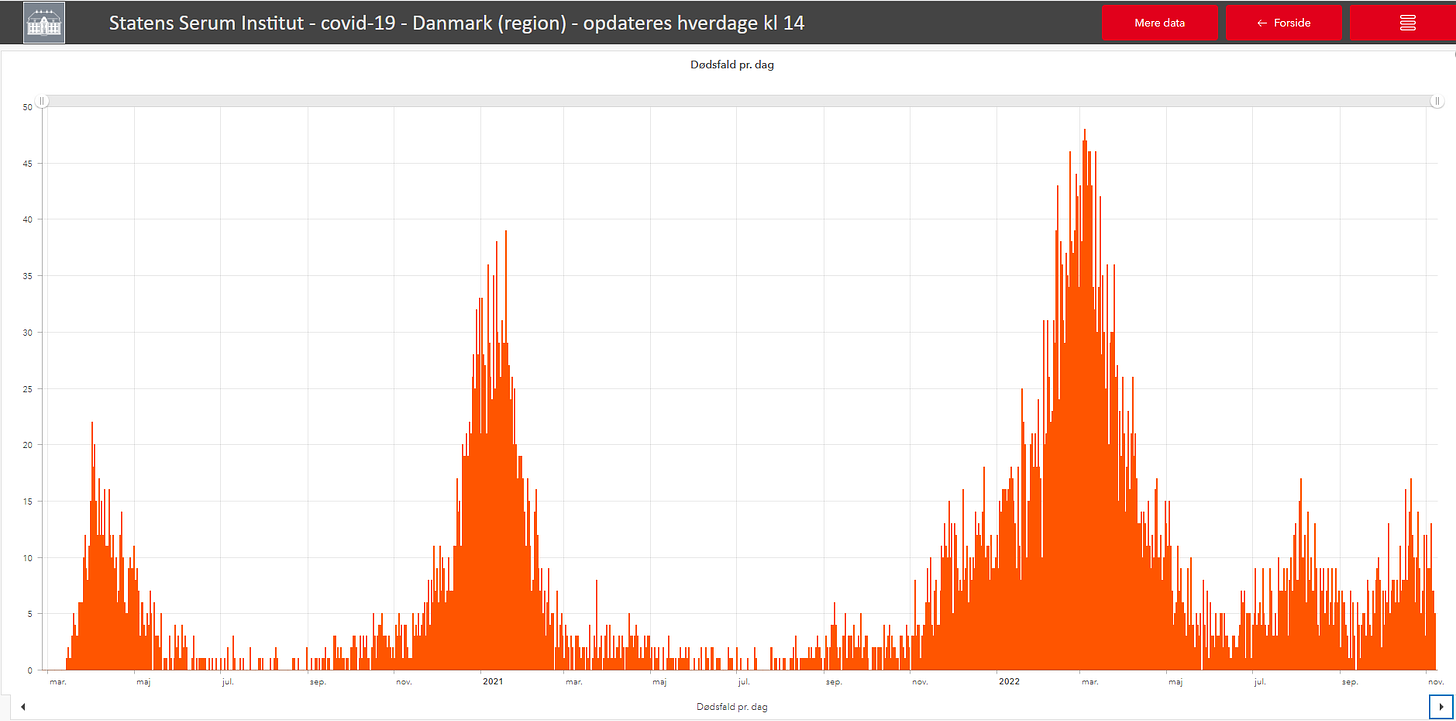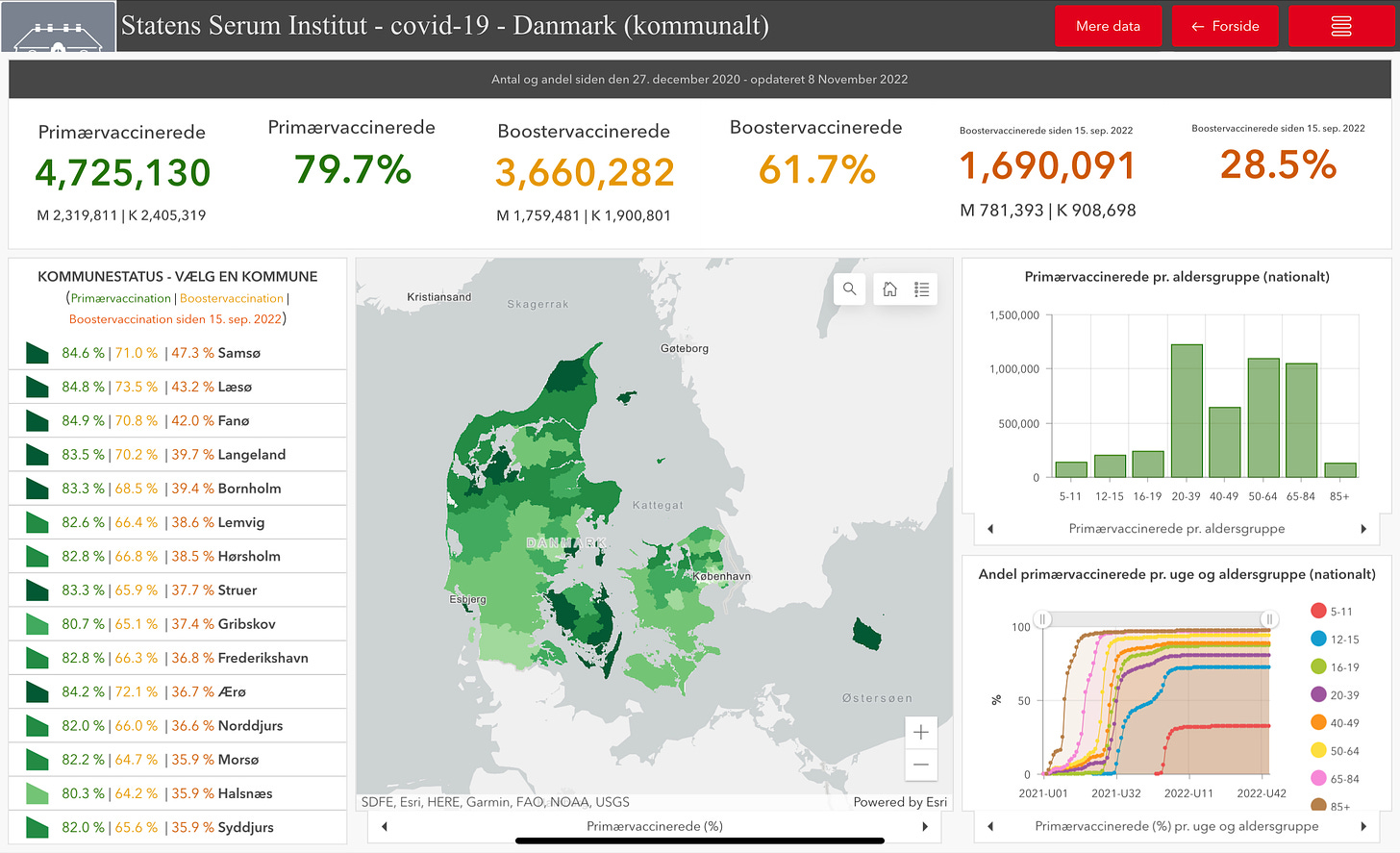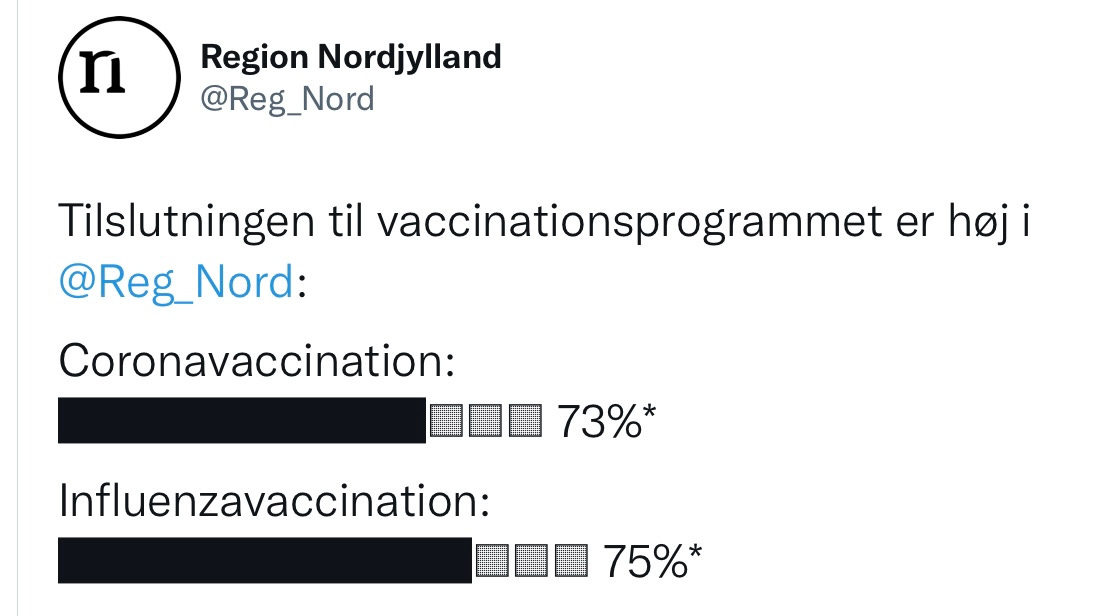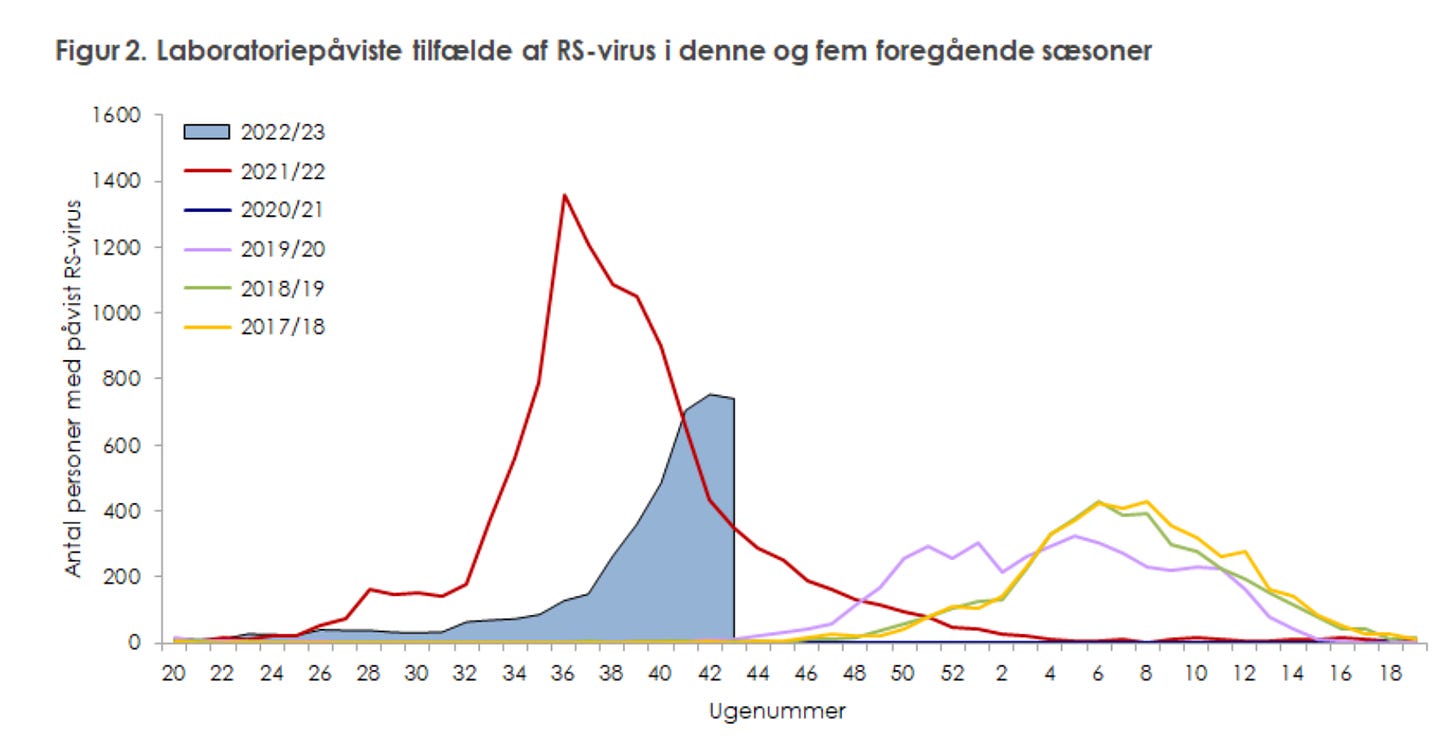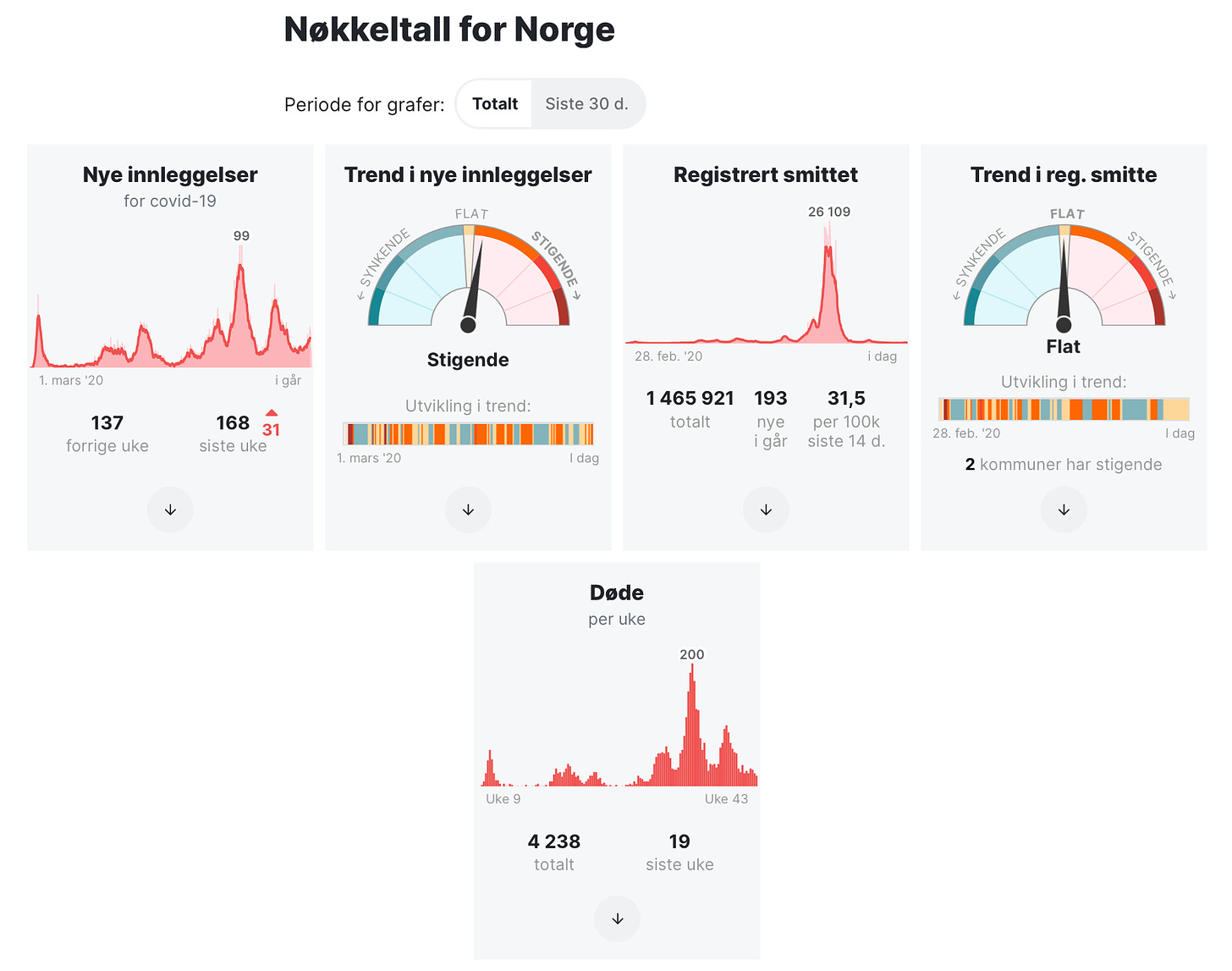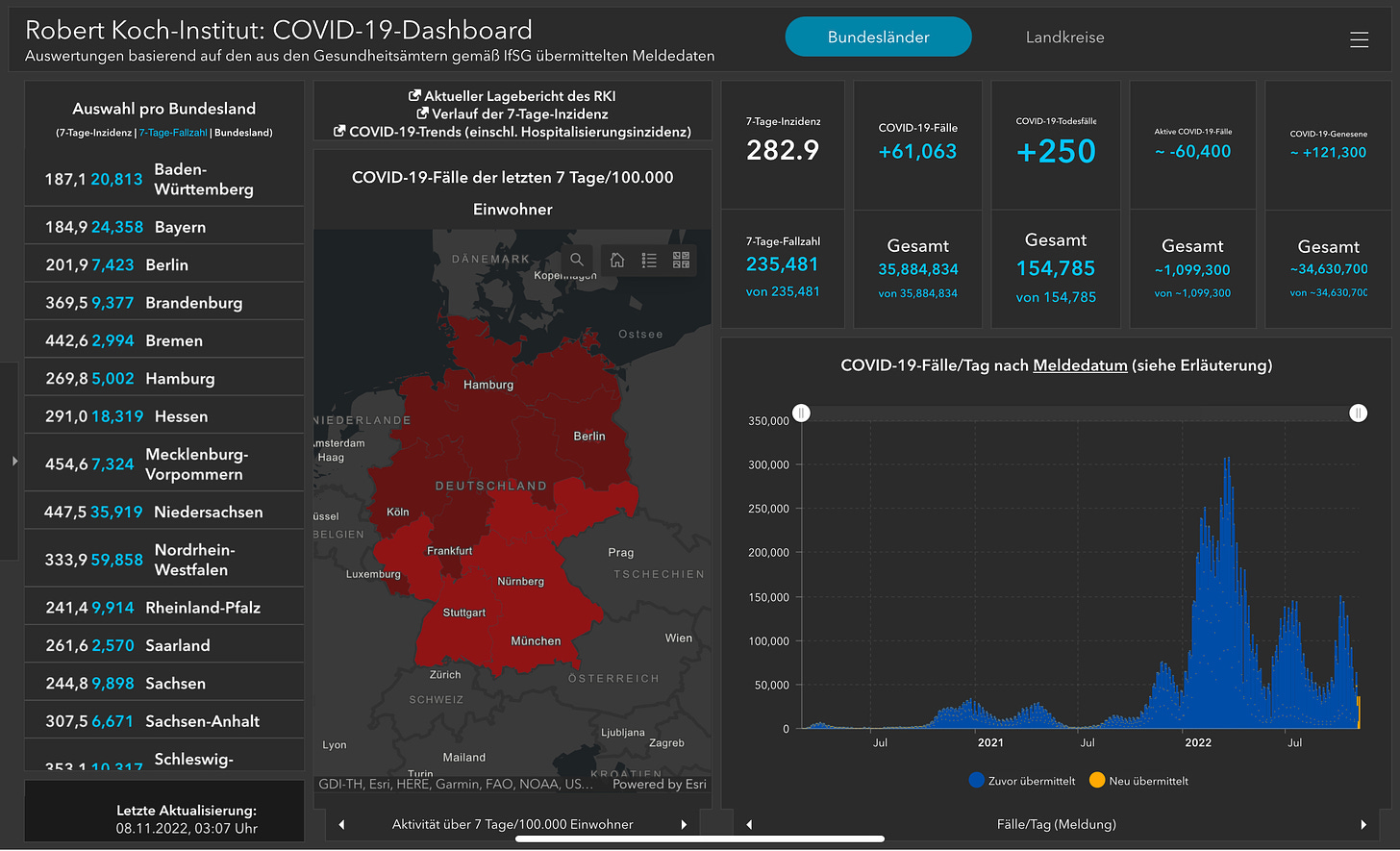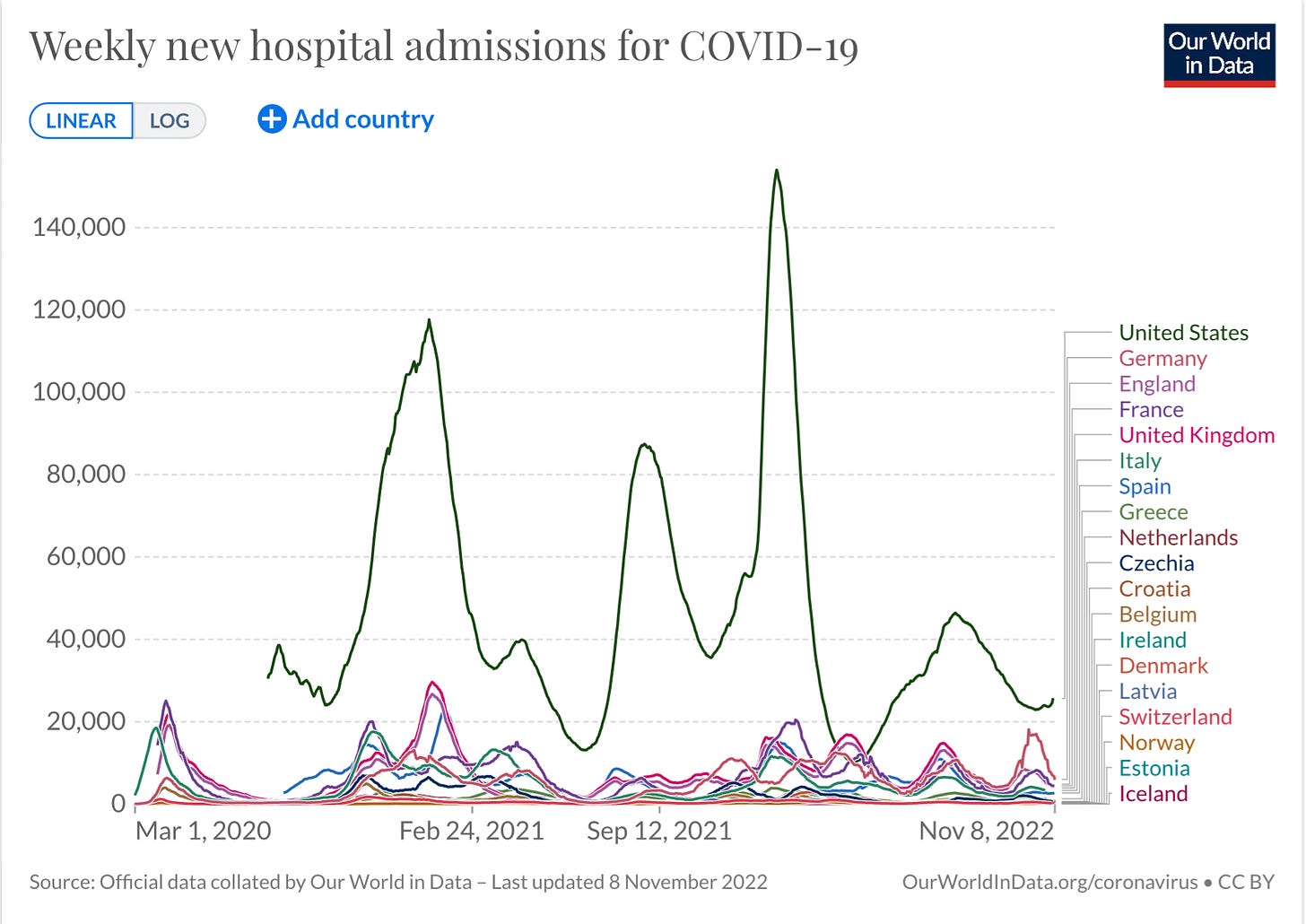The Evening Report - Nov 8
Norway warns its hospitals to brace for patients. Energy crisis impacts in Denmark.
🦠Pandemic🦠
🇩🇰
People in Denmark are failing miserably at staying home when they feel sick in order to prevent infection spread. With no COVID restrictions the Danish National Health Board has been urging people to do some basic things to prevent passing corona and other viruses around. But according to a new survey, well over half of people in Denmark continue to go to work even when they are sick.
The agency’s survey found 41% of respondents have gone to work even though they feel fatigued and are having joint and body pain. 36% have headed to work despite having a runny nose. 12% admitted to going to a social event even though they were symptomatic. Among young people, only 16% chose to stay home when sick instead of going to work or to a social function.
Unit Head Line Raahauge:
“When we get sick and choose to stay at home, we avoid infecting others. Staying at home is one of the most important recommendations for how we can fight and reduce the spread of infectious disease. Especially right now, when we are entering a season of increasing infection with, for example, influenza and coronavirus, which can hit both the individual and the family hard, and which can end up putting extra pressure on our healthcare system.”
Why are people not staying at home when sick? 50% of the health board survey respondents felt they could still go to work while sick and not infect anyone else, or that their symptoms weren’t bad enough to justify calling in sick. 18% reported feeling unsafe at work because a sick colleague showed up.
50% of respondents also felt their workplace had clear guidelines mandating what employees should do if they feel sick. The health board says that is an
In the survey, half answered that they think their colleagues are good at staying home when ill, while 18 percent have felt unsafe because a colleague has turned up sick at work. Furthermore, only half of us feel that there are clear guidelines at our workplace for how we should behave in the event of illness. The health authority says that is an 11% drop from the last time they did this survey.
“It can be helpful for the individual that there are clear guidelines in the workplace for how to behave when you are ill, so that you do not have doubts and turn up sick," says Line Raahauge.
The health board urges people to help prevent infection spreading by staying home when they are sick, maintaining good hand washing habits, coughing into your elbow, and keeping indoor spaces well ventilated.
1,528 people took part in the survey, which was conducted in September.
-
COVID hospitalizations (335) have dropped (-33) while the number of severely infected people in an ICU ( 13) crept upward (+1) of those, the number on a ventilator (6) was unchanged day to day.
The number of infection admissions into a psychiatric facility (66) declined slightly (-1).
-
Denmark reported 733 new COVID infections (underreported), including 318 reinfections, and seven more coronavirus deaths in the last day.
While pandemic numbers mostly head in the right direction, fatalities over the last month or so have been fairly high although they seem to be decreasing now, as you can see in the graph below.
With 7,540 PCR tests taken on Monday, that equals a positivity percentage of 9.72%. Over seven days the rate is 11.95%. In both cases, the rate has declined.
-
The booster dose campaign has administered enough 4th doses so far this fall to cover almost 30% of the population.
-
Vaccination uptake is high in Region Nordjylland. The region reported on Tuesday that 73% of those eligible for a COVID booster dose have had the shot. The booster dose campaign has also been combined with an influenza vaccination effort, and even there the region is reporting a 75% uptake among target groups.
Health Planning Chief Consultant Anders Cinicola:
“Overall, this means that things are going really well, and many people in North Jutland have been vaccinated. For all vaccines, the North Jutland Region is well ahead in terms of acceptance.”
The region says for anyone needing a vaccination, there are still plenty of openings to book an appointment. The region has vaccination centers in each of its municipalities, and a number of family doctors can also administer the vaccines. That said, the region is warning that it will only operate at top capacity for another month. After that, vaccination efforts will be gradually scaled back.
The COVID booster dose campaign is targeting high-risk groups, seniors in care, healthcare staff, and everyone 50 years old and older. For those 65 years old and older, they can get a flu shot at the same time as getting boosted. A nasal spray influenza vaccine is also available for children between two and six years old, although nationally uptake across Denmark has been dismal.
-
After the COVID pandemic brought the global travel and tourism industry to its knees, business at Copenhagen Airport is finally starting to take off again. For the first time since the pandemic began, the airport will table a profit in its third quarter. According to airport management, the books will see a gross profit of about 234 million Danish kroner (about $42 million Cdn).
Managing Director Thomas Woldbye:
“Although the energy crisis, [Ukraine] war, inflation, and the risk of COVID variants continue to create uncertainty, it is expected that the year's accounts will end with a profit. So things seem to be brighter for the aviation industry despite many dark clouds on the horizon. Things are getting better, but we are definitely not all the way there yet.”
With passengers returning, the airport is also getting closer to being fully staffed as well, which is good news. Prior to the pandemic, there were around 2,700 people working at the airport. After laying off hundreds of employees during the worst of the infection waves, today there are now 2,350 employees with more being trained.
-
The RS virus wave continues across Denmark. There were 162 new infections confirmed on Monday, pushing the total so far this season to 5,204 cases.
With another 115 hospitalizations total RS virus admissions so far have reached 2,115.
With three deaths yesterday, the virus has claimed 28 lives to-date.
🇸🇪
The Swedish Public Health Agency updates its COVID statistics once-a-week every Thursday afternoon.
-
The number of COVID-related hospitalizations has fallen in Sweden’s capital region. There are 253 infected patients in Region Stockholm as of Tuesday, 51 fewer than there were a week ago. Four people are being treated in intensive care.
Chief Physician Johann Bratt:
“The COVID spread continues and has done so at a steady level for some time now. Vaccines continue to provide the best protection against severe infection, hospitalization, and death.”
Bratt says the region is beginning its influenza vaccine campaign.
“Starting today, it is recommended that you who are over 65, or are pregnant, or belong to a risk group, you can get vaccinated free of charge against the seasonal flu. At the same time as you vaccinate against the seasonal flu, you can get a COVID vaccination.”
In the last week, the region has recorded 517 new infections (wildly underreported) with 53 coronavirus cases being among vulnerable seniors in care.
It has also suffered another 30 pandemic deaths pushing the to-date death toll in the region to 5,656. Of those, 1,920 fatalities have been seniors in care.
The region adds that Sweden continues to struggle with a backlog of reporting pandemic fatalities as it has all year.
🇳🇴
Norway registered 193 new infections (underreported) in the last day. It added 19 more COVID deaths in the last seven days.
Over the last week, infection-related hospital admissions (168) have gone up (+31).
-
The Norwegian Institute of Public Health is warning hospitals across the country to brace for a wave of incoming patients this winter, especially over January and February. In a new threat assessment, the health agency says with another COVID wave arriving it expects the situation to be complicated by larger than-usual infection waves from influenza, RS virus, and perhaps whooping cough. In particular, it warns hospitals to expect an influx of young children who are more vulnerable than most to some of these viruses.
“Hospitals must prepare for the fact that there will be waves or epidemics of more respiratory infections this winter and thus probably more admissions than the usual pre-pandemic winters.”
The NIPH also warns the pressure on healthcare could be “long-lasting” if the infection waves from one virus to the next come one after the other.
It is urging people to take every precaution, especially by washing their hands frequently and making sure that if they are sick to stay home and avoid contact with others.
On the COVID situation ahead, the agency’s threat assessment says “a new coronavirus wave seems to be starting now with an increased spread of infection and an increasing number of hospitalizations.”
In particular, it warns about the threat posed by new COVID variants.
“A number of new Omicron subvariants are now circulating in Europe that appear to circumvent immunity better than previous subvariants. It is possible that one or more subvarieties will become dominant and contribute to a winter infection wave. The situation is still unpredictable. Continued preparedness and monitoring is necessary to deal with a possible variant with significantly worse properties.”
The institute says previous infection waves and significant vaccination uptake, as well as the number of those with hybrid immunity from being both vaccinated and having had an infection, will be a huge help in protecting the population.
The NIPH is also very concerned about this winters influenza season.
“We consider it very likely that there will be an influenza epidemic this winter.”
It says this is because of COVID restrictions all but wiping out the usual flu season for two years and most of a third. The agency says this has left an “unusual number of children” who have never had influenza before and thus have no built-up immunity to the virus. It says this could lead to the flu season starting much earlier with a much larger infection wave than is usual.
Norway’s national health institute also considers it also very likely there will be an RS virus epidemic to come for a lot of the same reasons.
As far as the whooping cough it says, while the situation ahead is unpredictable, it is likely there will be “significantly more” cases of whopping cough than normal this winter.
“The increase may lead to the number of hospital admissions of infants being greater than in the years before the pandemic.”
🇫🇮
The Finnish Institute for Health provides a once-a-week pandemic numbers update. It is tabled every Thursday afternoon.
-
The Finnish Institute for Health has taken the unusual step of publishing an open letter signed by 81 doctors and specialists from healthcare agencies across the country to defend its COVID vaccination recommendations. The agency continues to be under fire from healthcare workers who are upset Finland is the only country in the EU not to offer a 2nd booster dose to people working in the health sector.
The institute says its operations, professionalism, and independence have all been called into question in an argument that has become so heated it says “personal accusations” are now being made in public. In an effort to put a stop to the controversy, it has published the open letter, which is in full below.
We, the infection experts appearing under our name, want to express our full support for the statutory work done by THL and the evidence-based policies it makes. THL has clearly and transparently justified its solutions regarding coronavirus vaccinations. As experts in infectious diseases, we consider the current vaccination recommendations justified and trust the ability of THL's experts in the continuous evaluation of the research evidence and solutions based on them.
We consider it important that vaccination decisions are based on scientific research and information obtained from Finland's high-quality statistical material. In analyzing this, THL's know-how and its own research activities are key. We are concerned about the line in which vaccination decisions are made through public debate without a proper assessment of the benefits and harms, taking into account the other impact of vaccination that reduces health care resources.
We hope for peace of work for THL and for the professionals who carry out statutory infection control work on an official basis.
🇩🇪
Germany recorded 61,063 infections and another 250 pandemic deaths on Monday.
It added 2,654 new COVID hospitalizations, while ICU numbers (1,311) dipped (-30). As a percentage of total intensive care beds in the country, coronavirus patients are using 6.2%.
On the vaccination front, 77.9% of the total population have two doses, 76.3% have two, and 62.4% had a booster shot.
🇪🇺🇺🇸 🦠
Even as new COVID variants cause concern, it is important to point out that hospitalizations across most European countries continue to trend downward. In this chart from Our World in Data hospitalization numbers are contrasted between a several European countries and the United States.
This provides some indication that the firewall from vaccination and immunity from prior infection or hybrid immunity from having both continues to hold even as new variants take hold.
🇨🇦 💉
A Canadian study has found that the mRNA COVID vaccine from Moderna has a higher risk of heart inflammation than does the vaccine from rival Pfizer/BioNTech. The study from the British Columbia Centre for Disease Control has been published in the Journal of the American College of Cardiology
The study looked at vaccination data from about three million participants who had received two vaccine doses of either the Moderna or Pfizer/BioNTech vaccine in the province of British Columbia between January to September of 2021. Researchers identified 31 cases of myocarditis, swelling of the heart muscle, within 21 days of a second dose. This compares to 21 cases after a 2nd Pfizer shot.
Cases of myocarditis were much more frequent in men under the age of 40 who had been vaccinated with Moderna’s mRNA vaccine. For its part, Moderna has acknowledged the rare risk of the side effect. It is also worth mentioning the risk of myocarditis is much higher as a side effect of a coronavirus infection than it is from vaccination.
BCCDC Epidemiologist, Executive Director of Data and Analytic Services, and study author Naveed Janjua, MBBS, DrPH:
“Few population-based analyses have been conducted to directly compare the safety of the two mRNA COVID vaccines, which differ in important ways that could impact safety. Our findings have implications for strategizing the rollout of mRNA vaccines, which should also consider the self-limiting and mild nature of most myocarditis events, benefits provided by vaccination, higher effectiveness of the Moderna vaccine against infection and hospitalization [found in prior studies], and the apparent higher risk of myocarditis following COVID infection than with mRNA vaccination."
⚡️Energy Crisis⚡️
🇩🇰
While the worst fears of the energy crisis have yet to materialize, its impacts are still being felt in Denmark. The Danish government, and many others across the EU, initiated energy conservation measures to try and lower demand to limit straining energy reservoirs over the fall and winter.
In Denmark, thermostats in all public buildings have been capped at 19 degrees and the public has been urged to follow suit. But with Danish winters being more soggy than snowy housing agencies across the country are growing worried that if temperatures aren’t turned up indoors then it could result in serious mold issues. Companies in places like Ballerup, in the suburbs of Copenhagen and in Viborg on Jutland, have already sent letters to thousands of their residents warning them about mold.
Excerpt from the letter sent out by Ballerup’s largest housing company, Baldersbo, that was obtained by DR.
“Lack of heating in the home can cause serious indoor climate problems in the form of mold growth.”
The housing companies are asking residents to keep the heat on, albeit low (18 to 20 degrees) to save energy, and make sure it is on in all rooms of their home.
Another rising concern among housing companies is residents getting creative about heating their homes. Heating devices like space heaters that aren’t properly vented or other devices using gas or kerosene can result in carbon monoxide poisoning leading to hospitalization and even death.
-
It is not just mold, either; municipalities in Denmark are either turning down the temperature in hot water pools or, in some cases, closing them altogether to save energy. People undergoing physiotherapy for things like herniated discs in their back or who suffer from forms of severe arthritis use the hot water pools. The hot water helps alleviate and manage their pain. Without them it means that in some cases the pain and discomfort quickly mounts and begins to impact their daily lives.
The Danish Arthritis Association’s Director Mette Bryde Lind spoke to DR to say any energy savings in limiting or closing hot water pools will just result in more expenses elsewhere.
“We already saw during the pandemic that people who couldn't go into a hot water pool found it much more difficult to manage in everyday life. They will need help at home or help with shopping, or they will find it more difficult to be at work. So don't think you're saving money. You don't do that.”
🇩🇪
Europe’s energy crisis is hitting farmers in Germany who are either shutting down greenhouse operations due to energy concerns or moving away from crops requiring a lot of heat. German media company Bayerischer Rundfunk is reporting that crops like tomatoes are being abandoned with farmers choosing lettuce or cucumbers instead due to energy costs. But while the two vegetables require less energy, they are also less profitable. Farmers are also hoping that the German government will step in with some help.
🇺🇦/ 🇷🇺 War
🇸🇪/ 🇹🇷
Swedish Prime Minister Ulf Kristersson did not win over Turkey’s support for his country’s bid to join NATO in his state meeting with the Turkish President in Ankara on Tuesday. President Recep Tayyip Erdoğan said while some “positive steps” have been taken by Sweden it has not yet done enough to pave the way for Turkey to welcome Sweden into NATO.
In a joint press conference Erdoğan hinted pretty strongly that Turkey won’t make any decisions on Sweden’s NATO application until after national elections scheduled for next year. The Turkish President pushed for Sweden to take concrete steps to address Turkey’s concerns and even mentioned by name one person, he would like to see Sweden extradite to Turkish authorities.
Turkey, seeking to leverage the situation as much as it can, has been blocking Sweden’s NATO application over what it calls their support for groups like Kurdistan Workers' Party. The group is classified as a terrorist organization by the EU, US, and Turkey. By association Finland’s NATO application is also held up as it has publicly said it won’t become a member of the military alliance without close ally Sweden.
So far, 28 NATO member nations have ratified Sweden and Finland’s NATO membership application. But the Nordic nations need a clean sweep with a yes from all 30 countries to become NATO members. Just Hungary and Turkey have yet to vote.
-
Sweden is going to take another crack at winning Turkey over. The Swedish parliament announced on Tuesday that a vote on a constitutional amendment to toughen up the country’s anti-terror laws would be held next week. In a statement, the parliament stated that the proposed amendment would pave the way for new laws “to limit freedom of association of groups involved in terrorism.” This, of course, is a key demand by Turkey in order to get onboard with Sweden’s NATO bid.
🇮🇹/ 🇺🇦
Italy is beginning to step up its military contributions to Ukraine. The country has spent most of the war dragging its feet and hasn’t even come close to matching fellow EU nations in sending arms to Ukrainian forces. Italy is one of several countries that heavily rely on Russian natural gas.
On Tuesday, it said it was ready to hand over air defense systems to Ukraine. In particular, it would provide the country with medium range SAMP/T and Aspide systems as well as shoulder-mounted Stinger armaments.
🇬🇧/ 🇪🇪
The United Kingdom and Estonia agreed to closer defense cooperation between the two countries in the face of Russia’s invasion of Ukraine. As part of the agreement announced on Tuesday, the UK will periodically deploy Apache and Chinook helicopters to the Baltic stage. The UK will also help Estonia’s military development.
As part of a cooperation roadmap signed by the Estonian and British Defense ministers, the UK will increase its military presence in Estonia to “deter aggression and defend European and NATO security.”
UK Defense Secretary Ben Wallace:
“The UK’s commitment to Estonia and European defense and security is unwavering. The deployment of assets such as Apache and Chinook helicopters to exercise in Estonia is a clear example of the strength of our relationship, and the importance we place on our ability to effectively operate side by side.”
🇩🇪/ 🇷🇺
German police raided the offices of Swiss banking giant UBS on Tuesday in what German media are reporting is an investigation targeted at Russian tycoon Alisher Usmanov. The raids were in connection with an alleged money laundering operation that builds on an investigation that resulted in another series of raids in September. In that case, more than 20 properties and a luxury yacht with connections to Usmanov were hit by police.
Usmanov is one of the world’s richest men and reportedly a close ally of Russian President Vladimir Putin. He is also subject to a number of sanctions by both the United States and the European Union.




